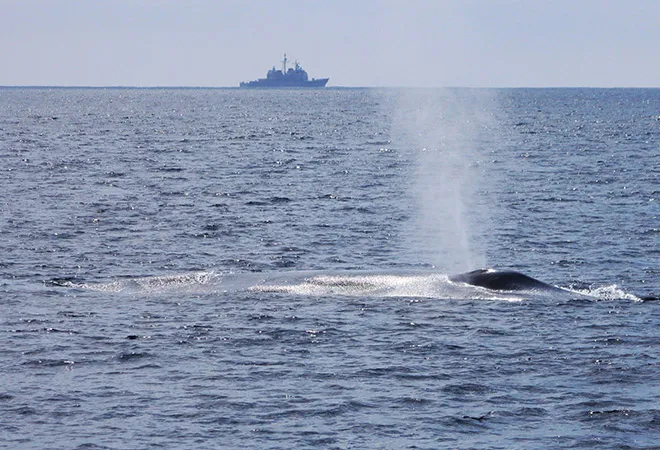 This piece is part of the series, Sustainable Development in the Indo-Pacific
This piece is part of the series, Sustainable Development in the Indo-Pacific
Military leaders preparing for conflict readiness in the Indo-Pacific maritime theatre should be aware that they are tackling more than one kind of war; aside from the conventional one, they are also simultaneously fighting climate change. Winning both these wars requires reaching out to unaccustomed bedfellows with vastly different expertise from their own. This kind of interdisciplinary coordination and collaboration is not spontaneous. It must be carefully implemented, from inception to execution. It requires its own kind of external diplomacy and domestic statesmanship. This brief will look into why India could be a good candidate amongst the Indo-Pacific nations to offer to play such a coordinating and diplomatic leadership role.
Climate change in the Indo-Pacific
The battle against global warming is already underway in the Indo-Pacific. The area is frequently assaulted by violent weather events, leaving numerous fatalities in their wake<1>. According to the International Federation of the Red Cross and Red Crescent, in 2021 alone, over 57 million people were affected by climate disasters in the Asia Pacific region. For countless survivors, their livelihoods, shelter, savings, food supplies, and meagre possessions are destroyed in the blink of an eye, exactly like a bomb dropped from the sky in a conventional conflict. Hence, we do not hesitate in referring to it as one of the “wars”. Any formal battle preparations for “over the horizon” military wars in the same Indo-Pacific maritime theatre cannot authentically proceed nor succeed without taking cognizance of the ongoing battle against climate change. Why is that so? Because three sets of international global commitments are currently in force, and must be respected, both inside and outside the Indo-Pacific zone.
Any formal battle preparations for “over the horizon” military wars in the same Indo-Pacific maritime theatre cannot authentically proceed nor succeed without taking cognizance of the ongoing battle against climate change.
Six years ago, in late September 2015, the world pledged to implement 17 United Nations Sustainable Development Goals (SDGs), of which SDG 14 was “Life Below Water”—To conserve and sustainably use the oceans, seas, and marine resources for sustainable development. We had, therefore, pledged to stop ocean acidification and desist from choking the marine environment with non-degradable plastics and oil/chemical/pollution/noise contamination.
Just six weeks later, on 15 December 2015, in Paris at COP21, the global community declared its intention to seek a worldwide truce in the ongoing climate war. In an effort to ensure the survival of future generations, we agreed to a threshold temperature limit. We promised to stop our heavy assault on the planet with greenhouse gas emissions and our plundering of natural capital in our Nationally Determined Contributions (NDCs) commitments.
At COP26 in Glasgow, November 2021, we renewed our vows and deepened them. We committed, amongst other things, to: Protect vast marine areas, take specific actions to prevent ocean acidification and sea level rise, phase out plastic pollution, save coral reefs, and pursue carbon sequestration in the blue economy through careful management of mangrove ecosystems. India also committed to a net zero goal for 2070, which is about far more than emissions alone; it cannot be achieved without protecting natural capital in all its forms.
The conundrum is that the preparation for potential military action in the Indo-Pacific poses a high risk of undoing our newly-minted climate commitments. Naval armoured vessels are noisy and run on highly polluting heavy fuel oil (bunker oil). They are detrimental in every way to ocean health. Military training exercises, live ammunition, overflights taking off and landing on aircraft carriers, submarine exercises, and even un-armed patrol vessels will all magnify the very carbon footprint we and others in the region are trying to lighten. It will be disastrous for small island developing states (SIDS) and all forms of marine life. Good ocean governance calls on us to mindfully and explicitly acknowledge this contradiction. We should pledge to address it pro-actively with all the required expert resources and funding, instead of sweeping it under the rug.
The conundrum is that the preparation for potential military action in the Indo-Pacific poses a high risk of undoing our newly-minted climate commitments.
It is possibly the first time in human history that conflict preparations will have to be made in a climate-smart way. It is also ultimately in the interest of all Indo-Pacific countries that repeatedly take the brunt of violent climate disasters or submergence threats. They must insist on being served by military preparations that will not fuel further disasters. Whatever happens in the Indo-Pacific theatre in the furtherance of national security interests of a bloc of countries, cannot be allowed to jeopardise the SDGs or the COP commitments in the battle against global warming. Military brass and foreign ministry mandarins in all key countries are very likely to instantly and vigorously deflect such additional responsibilities. They will claim that being climate-sensitive in their combat planning is far outside their bailiwick, and in any case unprecedented.
This moment calls for strong leadership and a willingness to grasp the nettle by one or more countries. They must persuade others that there is no room for business as usual, even in defence matters. Military preparations can and must take cognizance of how to manage and minimise ecological damage, and they must transparently measure their impact and share the resultant data. Otherwise, in future history books, the Indo-Pacific may mark the unravelling of a truce with nature that we claimed to be pursuing in our battle against global warming. This must be prevented at all costs.
Contrary to all historical practice, this time, the sanctity of the marine ecology must be flagged as being of global consequence during naval warfare preparations. An upfront risk mitigation strategy is needed. This must encompass adequate communication, collaboration, institutional coordination, and assigning of specific accountability functions. Ultimately, evidence gathering to assess outcomes, shared with an empowered group for transparency and credibility, is also needed. This is hard work. India can be a good candidate to seize this opportunity of creating a meaningful action-oriented ocean governance dialogue, and it can also lead by example. It will need to assemble a home-grown task force of “unaccustomed bedfellows” from both the scientific/ecologist community as well as military planners. They can help to educate each other about the respective challenges they face, to jointly arrive at a better outcome. Once the Cross Sectoral Task Force is up and running at home, India can invite other Indo-Pacific nations to join and participate.
Why is India a credible partner to show such leadership? Prime Minister Modi captured exactly why near the start of his speech at the East Asia Summit on 4 November 2020: “Terrorism, violent extremism, sharpened conflict over resources and territory, including maritime space are the major problems of our times. International laws and rules, including those that govern the maritime domain such as UNCLOS, are under increasing strain. Trans-boundary challenges such as climate change, marine pollution, and unregulated and excessive exploitation of resources are making our planet insecure…. We all agree, and it is to the benefit of all of us that Indo-Pacific should be a space in which freedom of navigation, overflight, sustainable development, protection of the ecology and the marine environment, and an open, free, fair and mutually-beneficial trade and investment system are guaranteed to all.”
Apart from this early signal by the Prime Minister, India is also amongst the Indo-Pacific actors with a net-zero commitment. India, therefore, has a leadership opportunity to thread this difficult needle, already alluded to in public by PM Modi.
Can India do it?
Internal silo-smashing and cross-sectoral coordination has no long-standing tradition in the Indian government. However, on the journey to net zero, past habits will have to change. Unstinting efforts at communication, awareness raising, capacity building, collaboration, monitoring, and data gathering will be the watchwords in every sector. Why not start here? Mandating and supporting such unlikely dialogues must be some of the strong risk mitigations put in place to avoid any unwanted “friendly fire” that could thwart India’s net zero ambition.
<1> Most recently Typhoon Rai December 17 in the Philippines, Landslide at jade mine in Myanmar December 22, Floods in Malaysia December 14, Mount Semeru volcanic eruption Indonesia December 14, South India/Sri Lanka floods December 1.
The views expressed above belong to the author(s). ORF research and analyses now available on Telegram! Click here to access our curated content — blogs, longforms and interviews.



 This piece is part of the series,
This piece is part of the series,  PREV
PREV


